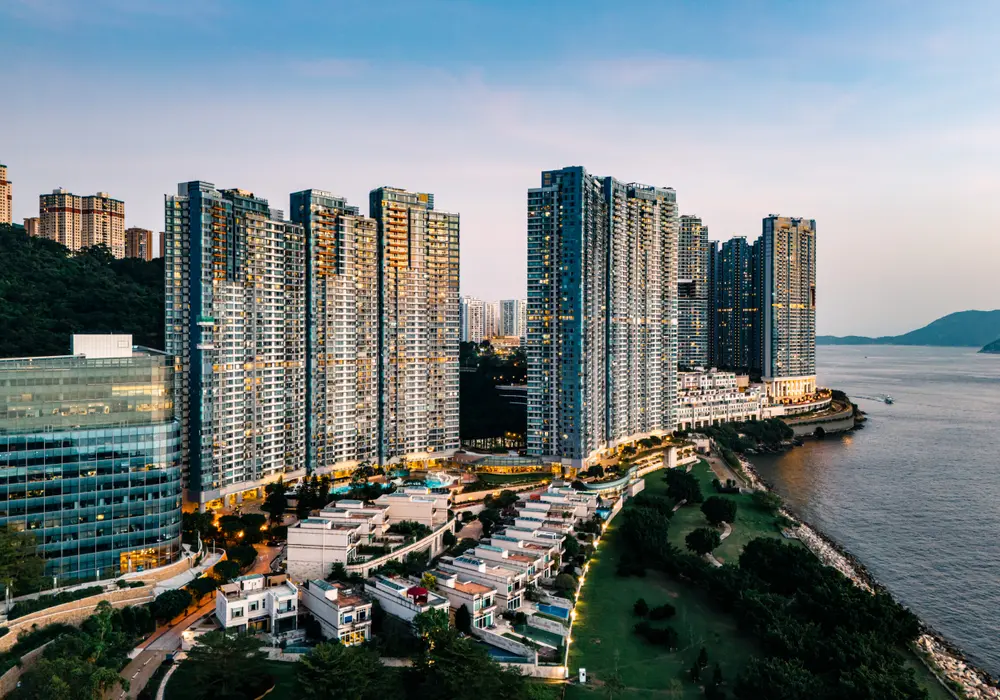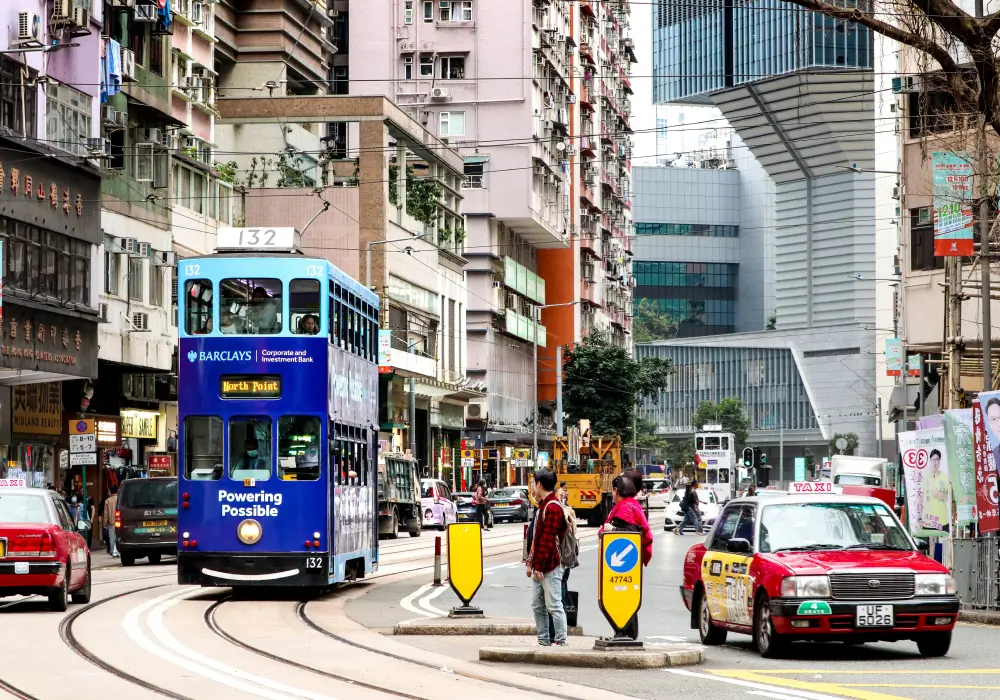
Housing 101: A Quick Guide for Novice Hongkongers
- 31 Jul 2024
- Living & Tax
Identifying suitable accommodation is a key consideration for individuals moving to a new city. While on the surface the city is constantly ranked amongst one of the most expensive to own or rent a property in, the truth is a lot more nuanced.
At 1,104 sq. km, land mass in Hong Kong is valuable, but far from unavailable. What we’re getting at is: despite being seen as a city, Hong Kong’s residential market offers a large variety of housing types and lifestyle options, from high-rise apartments in the heart of the city, ultra-lux homes perched along gentle hillsides, to well-connected new town condos and tranquil village houses settled close to nature. Apartments are by far the most popular option due to their practicality, general accessibility, and just how widely available they are across the city. Private detached houses with garden are also an option in Hong Kong, albeit on the luxury side.
A recent policy change is also set to benefit newcomers in Hong Kong. In a bid to change policy direction and promote the economy, the HKSAR government has cancelled all demand-side management measures for residential properties effective from 28 February this year, meaning there’s no more special Stamp duty (SSD), Buyer’s stamp Duty (BSD) and New Residential Stamp Duty (NRSD) in residential property transactions. To arriving expatriates, this posts an excellent opportunity to enter the homebuying market with reduced expenses.
In short, you're in luck if you're looking into purchasing a property in Hong Kong; whichever type of lifestyle you wish to have in Hong Kong, now is likely a better time than ever to get your foot in the door:
- If you prefer living near your workplace for minimal daily commute time, you don’t need to break the bank to live in Central, the traditional Central Business District (CBD) of Hong Kong, and surrounding areas like the Mid-Levels, Sheung Wan and Sai Ying Pun — traditional tenement buildings and walk-up apartments are plentiful and often reasonable in mid- to long-term pricing. For more information, you can check out our other article, which includes steps to finding suitable housing.
- For nature lovers, spacious village homes are available at a lower price depending on the location; the expansive and highly efficient public transportation network in Hong Kong means you’re never too far away from urban action, even if you’re tucked comfortably in the tranquil countryside.
- Modern high-rise apartments are by far the most widely available housing option, often coming in large supplies in new town areas. Well connected by public transportation, you can enjoy both the proximity to city centres and the calmer pace in newly developed districts.
- The Hong Kong government has made tremendous effort in facilitating a mature Innovation & Technology (I&T) community to organically accelerate the development of the digital economy. If you’re an I&T talent or an entrepreneur, you may consider unconventional housing options, such as Innocell by Hong Kong Science and Technology Park, a partnership project set up specifically to provide accommodation for and create a closely knit tech and startup community. Take a read of our other article to learn more about official support for the I&T industry and related fields.
However you envision your lifestyle, there’s a housing option to facilitate that in Hong Kong if you know where and how to look.
Renting a place in Hong Kong
For many talent new to Hong Kong, renting is the superior choice, allowing them to explore different parts of the city with relatively low commitment. From studios to luxury townhouses, the leasing market has always had a wide variety of houses and apartments for the taking.
A relatively new and increasingly popular housing option would be serviced apartments, popular amongst those who enjoy an extra layer of value-added service to complement their daily routine. A fairly wide choice of serviced apartments is available in Hong Kong, at sizes mainly under 2,000 sq. ft., typically in the form of studios, one bedroom with a living room, bathroom and open kitchen, or with two bedrooms. These are typically highly polished living spaces with weekly housekeeping services, making them especially suitable for fresh-off-the-plane talents who are still weighing their accommodation options. Another upside for serviced apartments are their flexible leasing contracts, often allowing for short- to mid-term stay before one can find a more permanent living space; many of them are located near key commercial districts as well, making serviced apartments a great first home base for many.
Buying a home in Hong Kong
Given Hong Kong’s densely populated and highly developed landscape, the real estate market in the city is notably robust. Dozens of popular property apps make home-shopping more accessible than ever, and physical real estate agencies can always be found around the corner if you’re looking for more personal recommendations. But regardless of how accessible buying a home might seem to be, searching for the right place is not easy.
Depending on the budget, you may want to explore as many options as possible through agencies and online. Once you have a shortlist of potential homes, you can use the bilingual search engine provided by the Property Information Online (PIO) to locate a property record and obtain from the authorities essential information, such as saleable area, age and permitted occupation purposes. Buying a home is a once-in-a-lifetime decision for many people, and we definitely recommend doing more thorough research on the property and the homebuying process — the more you prepare, the more the decision would pay off in the long run. To learn more about how to purchase or rent a apartment, you may refer to our previous articles for a step-by-step guide.
Home-shopping tips and tricks
Whether you’re renting or buying, we’ve got a few tips to share once you’ve made the decision to find your second home in Hong Kong.
Before the search for your dream home starts, it’ll do you well to know the layout of a typical Hong Kong apartment — a combined living-dining room, a kitchen, a utility or laundry area, two or three bedrooms, bathrooms, all perched on one level. Some units come with balconies; top-floor units may have exclusive access to the flat roof area above. Modern developments often provide communal recreational facilities which may include a swimming pool, tennis and squash courts, a clubhouse and gymnasium, billiards and badminton rooms, and play areas for children.
Now that you have a basic concept of what the typical apartment looks like, it’s time to zoom into the nitty-gritty. When you’re on a house tour, be sure to check these household details before you sign on:
- Look for any water stain on the ceiling, bay windows and walls to see if there have been water leakages
- Inspect electrical wiring, switches, water pipes, toilets, etc. to see if they work properly
- Check if there are any illegal alterations to the property and seek a professional advice, if necessary
- Enquire whether the property is occupying any common area
- Enquire whether furniture, electrical appliances and decoration are included in the sale of property; if yes, specify the inclusion in the agreement of sale and purchase
- Check who are in occupation of the property and enquire what their capacities are and whether they hold any interest in the property
- Ensure the real estate agent possesses a valid license before signing a contract. Check out Estate Agents Authority’s “A Guide to Tenancy" for more information.
Like everywhere else, both the tenancy agreement and the Sale and Purchase agreement are legally binding — make sure the place is exactly the way you want it before committing to a contract!
There’s no wrong answer as to where and how you settle in Hong Kong. For more accommodation information and support, visit our Supporting Services for Accommodations or Integrated Settlement Services for moving to Hong Kong.
Recent posts
-

Move to Hong Kong: Enjoy all-inclusive living amenities with family
- 31 Dec 2024
- Living & Tax
-

Hong Kong’s support for innovation and technology
- 20 Dec 2024
- Economic Developments & Potentials
-

Guide for non-local graduates seeking employment in Hong Kong
- 18 Dec 2024
- Living & Tax
-

The growing esports and gaming market in Hong Kong
- 29 Nov 2024
- Economic Developments & Potentials
-

Hong Kong's rise as a FinTech hub
- 28 Oct 2024
- Economic Developments & Potentials
-

Mastering market trends in Hong Kong to stay ahead of the curve
- 24 Oct 2024
- Economic Developments & Potentials
-

Tips for a stress-free relocation to Hong Kong
- 22 Oct 2024
- Living & Tax
-

Cost of Living in Hong Kong: accommodation, food, and transportation
- 15 Oct 2024
- Living & Tax
-

Elevate your creative career at the global stage of innovation in performing arts and art events
- 07 Oct 2024
- Economic Developments & Potentials
-

Thrive in Hong Kong: A promise of a clean and fair society for global talent
- 04 Oct 2024
- Living & Tax

